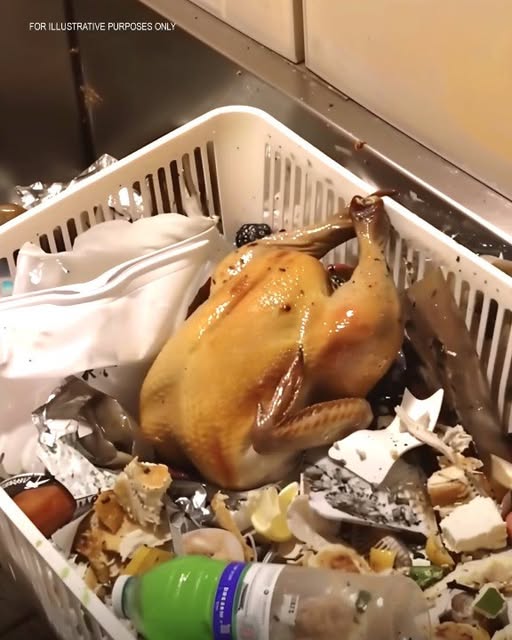The Dinner That Changed Everything
I never imagined that a simple roast chicken would become the turning point of my marriage. But sometimes, the smallest, most ordinary moments carry the weight of everything unsaid, everything endured, and everything finally realized.
It was supposed to be a quiet Friday evening. For weeks, I had felt the growing distance between Neil and me. Conversations had become mechanical, laughter scarce, and affection nearly extinct. Still, I believed—perhaps stubbornly—that I could bridge that gap with something as simple, as comforting, as a home‑cooked meal.
That morning, I woke with a sense of determination I hadn’t felt in months. I opened my laptop and scrolled through recipes, my fingers pausing over a rustic roast chicken with orzo. It wasn’t extravagant. It wasn’t fancy. But it was warm. Honest. A dish that spoke of home, of effort, of love.
I pictured the scene: candles glowing softly on the table, the aroma of garlic and rosemary filling the air, Neil walking in and—just for once—smiling in genuine appreciation. It had been so long since I had seen that look on his face.
By noon, I was at the market. I chose each ingredient with care—the chicken plump and fresh, the herbs fragrant, the lemons bright and heavy with juice. Even the orzo felt symbolic, like the tiny grains could weave us back together if only I cooked them with enough love.
Back at home, I tied my hair up, poured a glass of wine, and set to work. The kitchen came alive with sounds and scents I’d missed: the rhythmic chop of celery, the sizzle of shallots in olive oil, the sharp zest of lemon under my grater.
When Neil walked in briefly before his meeting, I looked up with a shy smile.
“I’m making something special for dinner,” I told him. “A roast chicken with orzo. I think you’ll really like it.”
He didn’t look up from his phone. “Sounds complicated,” he murmured.
“It’s not,” I said quickly, wanting him to know I wasn’t trying to show off—just trying to care.
But he was already walking away. “I’ve got a client meeting. Don’t wait up if it runs long.”
My smile faltered, but I kept cooking.
By the time he returned that evening, the house had transformed. Candles flickered softly. The table was set with our best plates. The golden‑skinned chicken rested proudly on its bed of herbs, steam curling in the air like an invitation. I had even put on the dress he once said was his favorite, though he hadn’t noticed it in years.
I heard the door open, his shoes on the mat, the keys clinking into the bowl. My heart beat faster. Maybe this time would be different.
But before I could greet him, I heard the sharp scrape of metal against ceramic—the sound of him tossing something into the trash.
I rushed into the kitchen.
Neil stood over the garbage can, using a spatula to push the entire roast chicken into the bin.
“What are you doing?!” I cried, my voice trembling.
“It sat out too long,” he said calmly, not even looking at me. “Unsafe. You’ll thank me later.”
I stared at the trash, at the rosemary sprigs tangled with golden skin, the orzo scattered like confetti in the bin. Hours of care, discarded in seconds.
“It was fine,” I whispered, my throat tight. “It was sitting out while I prepped. That’s all.”
“I was timing you,” he replied evenly. “Twelve minutes. I’ve told you before—chicken shouldn’t be out more than ten.”
The words hit me like cold water. He hadn’t just ruined the dinner—he’d been watching, waiting, measuring.
I sank into a chair, my hands trembling. It wasn’t about food. It never had been.
It was about control.
The chicken was only the latest in a long line of rules: how I folded the towels, the “proper” tone to use in emails, the way my jeans should fit, the number of minutes acceptable for small talk at the grocery store. Every “correction” chipping away at me, until I was barely more than a shadow of the woman I used to be.
And as Neil sat on the couch, flipping through Netflix like nothing had happened, I finally saw it for what it was.
I wasn’t his wife anymore. I was his project.
That night, I ordered a pizza. Greasy, cheesy, unapologetically imperfect. I ate it alone, the candles still burning faintly in the kitchen.
The next morning, as sunlight spilled across the table, I opened my laptop and typed an email to my attorney.
“Let’s move forward. I’m ready.”
No screaming. No dramatic confrontation. Just the quiet certainty that I was done living small.
Neil would later tell friends that our marriage ended over “a stupid chicken.” He’d laugh, shaking his head, painting me as irrational.
But it was never about the chicken.
It was about the years of being measured, corrected, and diminished. About the endless rules that made me feel like an intruder in my own home. About the way he could throw away not just food, but effort, love, and me—without a second thought.
Months later, after the divorce, I met Theo.
He wasn’t extraordinary at first glance—mismatched socks, a love of old jazz records, a habit of getting flour everywhere when he baked bread. But he was kind. Steady. Safe.
One evening, we unpacked groceries together. I pulled out a chicken I’d forgotten on the counter for hours. I laughed nervously, waiting for judgment.
“How long’s it been out?” Theo asked.
“Six hours,” I admitted.
He shrugged. “Then let’s make pasta instead.” He tossed the chicken without a lecture, kissed my forehead, and asked if I wanted red sauce or cream.
No timer. No scolding. No control.
And in that messy kitchen, with jazz playing and flour dusting the counter, I felt something I hadn’t in years: free.
The chicken wasn’t the reason my marriage ended.
It was the moment I finally realized I deserved more than a life measured in rules and timers.
It was the night I stopped being grateful for scraps of affection and started demanding a seat at my own table.
And that’s how a ruined dinner became the beginning of a brand‑new life.


